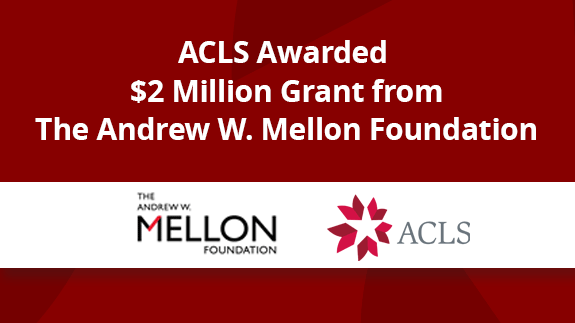ACLS Awarded Mellon Grant Advancing Equity Across Disciplines

ACLS has received a grant from The Andrew W. Mellon Foundation to support summer institutes to explore innovative practices of equity, inclusion, and structural change in the academy.
The American Council of Learned Societies (ACLS) has received a $2 million grant to fund a three-year series of summer institutes, beginning in 2020, that will gather people from across the landscape to coordinate the flows of knowledge and action in various sectors of the academy. As a convening body with vision and experience, ACLS will use its long history of partnerships with learned societies and institutions of higher learning to enable systemic advancement in the areas of equity and inclusion.
Drawing on the successful model of the Mellon-supported Scholarly Communication Institutes, ACLS Summer Institutes will bring together members of three groups: directors and leaders of learned societies, university faculty and administrators, and emerging scholars, especially scholars of color and first-generation scholars. “These are three groups that do not naturally gather,” says Joy Connolly, President of ACLS, “and we are grateful that The Andrew W. Mellon Foundation sees the will and energy for change that we can unlock by enabling them to determine how best to work together.”
Among the issues the institutes will tackle are: expanding the definition of “scholarship” today; how best we can advance diversification, curricular change, and other activities that make our colleges and universities most responsive to the interests and needs of diverse learners in the 21st century; societies’ work to support the efforts of universities, and how that work can be better understood and amplified across academia.
The institutes will allow college and university leaders and learned society directors to work on best practices for the future together with emerging scholars, who know better than anyone the obstacles they face. Held over several days, the institutes will focus on how scholarly societies can refresh their own missions and energize their membership through concrete initiatives advancing equity and inclusion.
ACLS will define the themes of the institutes in consultation with our advisory group and broader membership, and institute participants will play a decisive role in setting the meeting agenda and proposing cases, problems, and projects for the group to address.
This effort will enrich and amplify ACLS’s ongoing efforts on behalf of inclusive excellence in humanistic scholarship and to develop new programs beyond fellowships that will strengthen humanistic studies for the 21st century. In a range of recent Mellon-funded projects including the Postdoctoral Partnership Initiative, Public Fellows, and Community College Faculty Fellowships, ACLS has deepened its commitment to supporting humanistic scholarship across a wide range of institutions.
Details will be posted in the coming weeks.

